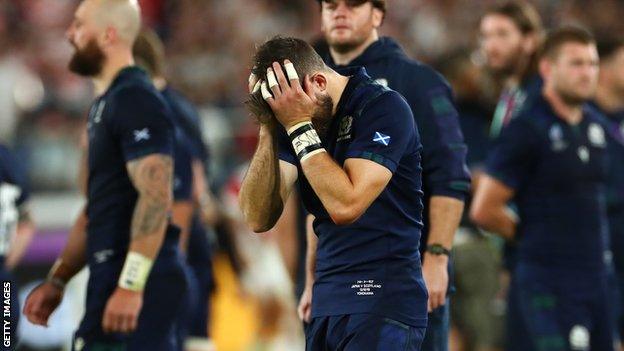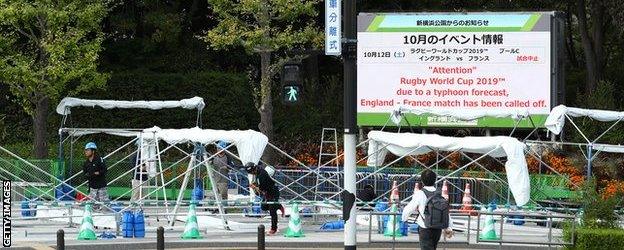Rugby World Cup: 'SRU chief Mark Dodson stance was no affront to rugby'
- Published

Scotland are out of the World Cup after Sunday's defeat by Japan, but the row with World Rugby rumbles on
When the news came through that World Rugby had put the SRU in the dock, the least surprised person in Japan would have been Mark Dodson, the man at the heart of the complaint. Dodson knew this was coming.
The game's governing body has referred the SRU to an independent disputes committee in the wake of comments made about the potential cancellation of Scotland's game against Japan in Yokohama last Sunday. Typhoon Hagibis had put the game in jeopardy and the SRU were incensed by what they saw as World Rugby's intransigence in coming up with a contingency plan that would have allowed the match to go ahead a day later.
It did occur on schedule, of course, and Scotland lost. They're out of the World Cup but the chief executive is now in the frame. This saga still has a way to run.
Late last week, reports suggested that the SRU were getting heavy and were threatening to sue the governing body if the game had to be cancelled. There was a story in the Daily Telegraph that they would seek millions of pounds worth of damages if the game didn't go ahead. A spokesman for Scottish Rugby said that Nick DeMarco QC had been brought in to pore over World Rugby's participation agreement and to plot the way ahead.
The headline about possibly pursuing legal action, and particularly the one that gave the impression - true or otherwise - that the SRU were chasing the money, were damaging to them. Mired in a battle with World Rugby, they may not have seen the optics all that clearly.
The headline might have been overly dramatic and the notion of an imminent compensation challenge a little exaggerated, but there is no doubt that part of DeMarco's brief was to assess how much financial damage would be caused to the "SRU brand" if the game was binned.
It wasn't their intention to pursue action against World Rugby any time soon, but a general discussion had taken place behind the scenes about what road they might go down in the months ahead in the event of the game being called off. That nuance didn't really come out and so, to some, it looked bad. "Ah, this is a money grab, this is grubby stuff, people may be about to lose their lives and the SRU are banging on about law suits and compensation".
Dispute has become bitter and divisive
On Thursday, the SRU feared they were "on the edge of being shafted". While World Rugby were saying that their own rules stated clearly the game could not be moved to the day after Hagibis had blown through, the SRU spokesperson argued that World Rugby's own rules suggested a force majeure clause and that they did, indeed, have the option to move it - and if they didn't then there was the inference, if not quite a directly stated threat, of legal action.
From that point on, it became bitter and divisive. Dodson received a warning from the sport's governing body. Upbraiding the union for potentially bringing the game into disrepute, it was a shot across the bows. Any more loose talk and a charge would be brought.
By then, Dodson was incensed and on a war footing. He felt that he had to do anything and everything to persuade World Rugby into moving the game back if it couldn't be played on Sunday. He argued that any chief executive in his position would have felt duty bound to do the same. He went on BBC Radio 4's Today programme on Friday. "For World Rugby to just simply state the game has to be cancelled goes against the whole sporting integrity of the tournament," he said.

England's match with France at Yokohama Stadium was cancelled
He referred to World Rugby's cancellation of England versus France and New Zealand versus Italy as avoidable if only World Rugby had contingency plans in place. Italy were denied a crack at the All Blacks. Had things gone their way - a big if, to be fair - they could still have made the quarter-finals. They were robbed of that chance and it set a precedent.
Having one rule for Italy, the governing body couldn't have another rule for Scotland. The game either went ahead on Sunday as planned or Scotland would meet the same fate as the Italians. "We're not going to let Scotland be the collateral damage for a decision made in haste," said Dodson in that Radio 4 interview.
Primarily, it is that comment that subsequently brought the charge from World Rugby. Dodson felt it was worth taking the rap. Doubling down, he called a news conference in Yokohama on Friday and appealed for common sense. That didn't go down well with World Rugby either.
They fired back with their own statement, effectively criticising the SRU for unedifying grandstanding on the eve of a Typhoon Hagibis, a storm that had been predicted to kill, and has killed, dozens of people. As of early evening on Tuesday in Tokyo, the death toll stood at 66.
The SRU interpreted World Rugby's statement as a crass and insulting conflation of events, an attempt to direct public scorn on to the whingeing Scots. In the face of an accusation of a lack of sensitivity for the impending chaos of Hagibis their ire rose ever higher.
SRU erred with compensation narrative
How will this shake down? By World Rugby's disciplinary rules, Dodson would appear to be bang to rights. The SRU will get a verbal slap or maybe a fine. The relationship between the two bodies - or between individuals on both bodies - was cool long before this. Now it's in the ice box.
Allowing a narrative to be formed that they were going to law and were looking for millions in compensation if the game was cancelled, the SRU erred. Dodson has denied that he ever spoke about money, but somebody in that organisation did. That's one point.
The other point is this - had the chief executive of any other union been in the same position as Dodson, you can bet your last fiver that they would have gone to war, too. The talk of the SRU's actions being an affront to the values of rugby and against the spirit of the game - that's been said numerous times - is sanctimonious garbage.
Ireland flew a lawyer in from Dublin just to contest Bundee Aki's red card against Samoa. Earlier in the tournament, Australia flew in a QC from Brisbane to challenge the red card given to Reece Hodge. If they did that for a red card, what would they have done if threatened with an exit from the tournament on a technicality? What would any of the big unions have done?
If anybody seriously thinks that the real heavyweights of this sport would have shrugged and accepted their fate then they've come down in the last shower.
On Sunday evening, in the hours before kick-off in Yokohama, Alan Gilpin worked the media room. Gilpin is World Rugby's chief operating officer and Rugby World Cup's tournament director. He moved around talking to journalists for about an hour, mostly those working with English newspapers. It would have been a surprise had some of the chat not revolved around the bitterness of the previous few days.
He walked past the area where the Scottish press was gathered on his way in and on his way out. Not a word was spoken.
